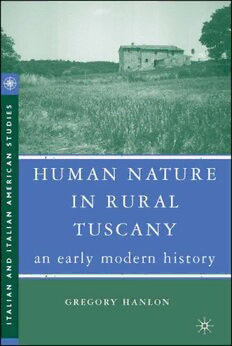
Human Nature in Rural Tuscany: An Early Modern History (Italian & Italian American Studies) PDF
233 Pages·2007·0.846 MB·English
Most books are stored in the elastic cloud where traffic is expensive. For this reason, we have a limit on daily download.
Preview Human Nature in Rural Tuscany: An Early Modern History (Italian & Italian American Studies)
Description:
Melding evolutionary theory and both animal and human ethology together with close, descriptive historical research on a typical Tuscan village in the seventeenth century, Hanlon explains the good reasons individuals had for behaving in ways that now seem strange to us. This fascinating study springs from the conviction that the building blocks of human life are universal: hierarchy and political participation; co-operation and competition, reproduction, invention, and adaptation. The author argues, however, that individual emotions, thought processes, and social predicaments are always set in specific times and places.
See more
The list of books you might like
Most books are stored in the elastic cloud where traffic is expensive. For this reason, we have a limit on daily download.
